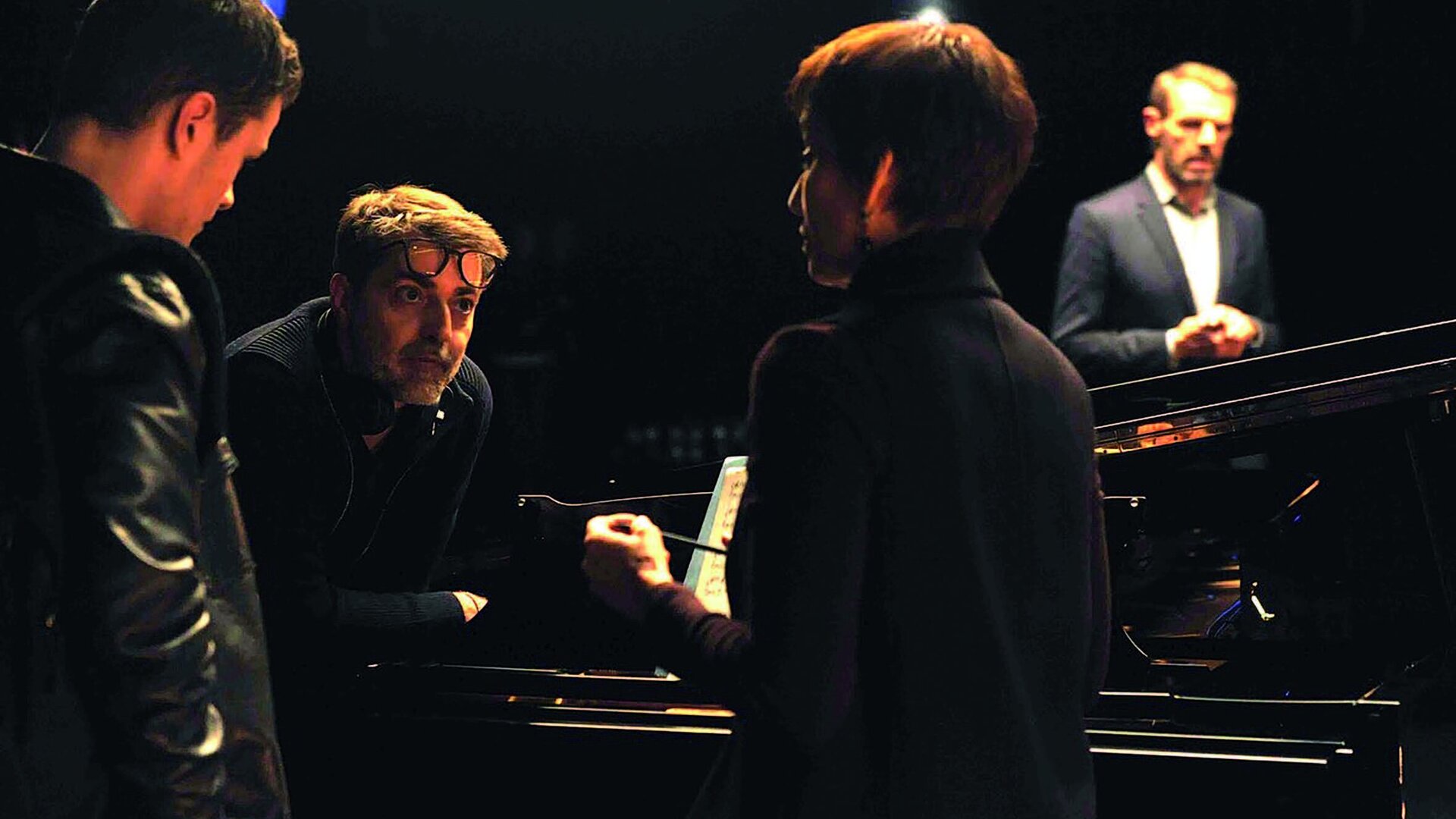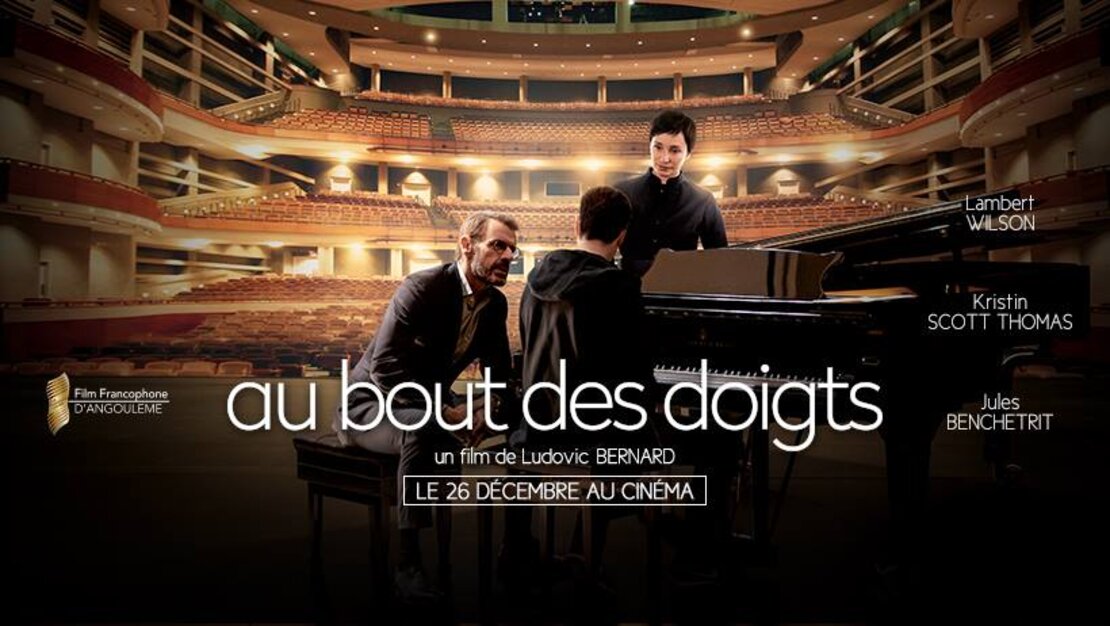One might say, Director Ludovic Bernard had the idea for the film "Der Klavierspieler vom Gare du Nord" (Au bout des doigts) so to speak by “passing by”. Bernard, known as Luc Besson's assistant director for many years, actually saw a young man at the Gare du Nord in Paris playing on a grand piano. Because of his great playing skills, the idea for the movie was developed, ever since this encounter.
The protagonist of the film is the one playing the piano at the Gare du Nord, and is discovered by the director of the conservatory, wo was just passing by and stopped because of the amazing talent he is encountering. His attempt to start a conversation is roughly interrupted by the police, because as they are entering the scene, the young pianist flees. This is when Bernard shows a rapid chase, which takes him back to his past as an assistant director - because as he told us on the eve of the Austrian premiere of his film, he was known as a specialist for staging chases in his function as 2nd Unit Director.
But the protagonist, Mathieu Malinski (played by Jules Benchetrit), manages to escape and as well to escape the conservatory, to which he does not want to go either. Only when a prison sentence is converted into community service, thanks to the commitment of the director, (played by Lambert Wilson -internationally known for his role as Merovingian in the Matrix trilogy of the Wachowski siblings; Wilson was even shortlisted as James Bond in the 1990s) the exceptional talent was finally accepting to join the conservatory. The milieu difference is further underlined by the role of the piano teacher, an elderly countess (played by Kristin Scott Thomas), the necessary obstacle for the director is provided by his boss, who wants to dismiss him, if the director isn’t serving anything or anyone new.
Despite good reviews, the film didn't go down as well as desired at the French box office, but with about 330.000 visitors it really didn’t fail either. Internationally it went down well, but it also had a slow start at the cinemas. In Austria the film store brought it to the cinemas at the end of April and at the beginning of April it was shown at the Festival du Film Francophone in Vienna.
Ludovic Bernard managed to establish himself as a director in 2017 with the film "L'Ascension". In “L’Ascension” he tells the true story of Nadir Dendoune, who takes part in a Himalayan expedition without any previous knowledge and really makes it to the top of the world, simply because of love. He wants to show his true love that he would do anything for her, even climb the Himalayas. In the film, Bernard turns the Frenchman of Arab origin, who did this amazing stunt in real life, into a Frenchman with Senegalese roots, played by Ahmed Sylla. The comedian plays him as an always friendly, tall and clueless suburban Parisian, who tramps through the landscape of the Himalaya and becomes the popular figure of the film.
Like the classic harlequin, the main character wants to climb the highest mountain in the world, simply because this seems to be the only way to conquer the heart of his Columbina. Bernard directs his film the exact same way, and it exceeded expectations with almost 900,000 visitors in France. His second film, the comedy "Mission Pays Basque", was less well received and is considered a flop. When Ludovic Bernard came to Vienna to present his film about the piano player, he was in the middle of preparations for his next film.
“You were born in Cannes and in your biography, it’s stated that you started your career at the film festival in your hometown. This sounds like paradise, Cannes Film Festival, and you, a simple student, in the middle of it.”
Ludovic Bernard: “Yes, it was like paradise. I skipped school to be able to work there and watch the movies. I had no idea about the directors or actors, but I was very impressed by the big screen and the pictures that were shown. I think it was after a performance of "Paris Texas" by Wim Wenders when I first knew exactly what I wanted to do. I was 15 years old at that time. I “borrowed” my father's 8mm camera, and never gave it back in the end.
“It seems like France is the only European country with a real professional film industry, is that right?”
“France is a great place to make films and make a living from it. More than 250 movies are released every year as well as countless TV-productions. The film industry is therefore very large and also very strong, and politicians are thankfully making every effort to ensure it remains like that.”
“In your debut film "L'Ascension", which was very successful, you transformed the leading actor from a Frenchman with Arabic roots into a black Frenchman. Why?”
“I know that there has been a lot of speculation about this, the only reason was that Ahmed Sylla was simply the best choice at the casting and convinced us all. There was no other reason.”
“I can totally agree with that, he is the popular figure of the film. How was the collaboration?”
“Very nice and also very simple. Ahmed Sylla does stand-up comedy and knows how to be really funny and likeable, he knows everything about comedy. He is full of positive energy and has infected everyone with it. What he had to learn was to listen to the other actors, to work together with them, because until then he was used to the fact that there was only him and nobody else in the centre of attraction.”
“The shooting took place in Nepal. Where did you shoot the summit victory?”
“We shot most of the film at original locations in Nepal. We were actually in one of the base camps at 5,364 meters and we climbed up to 6,000 meters to shoot. That’s where we found "our" summit.”
“In the opening credits Netflix is mentioned as your cooperation partner. How was the cooperation like?”
“There was no such thing for me, because Netflix bought the worldwide rights after the theatrical release in France. The deal was set up by my producer and unfortunately I never met anyone from Netflix.”
“Is it true that the idea for the piano player was really born at a train station? Was it difficult to find the young actor?”
“Yes, and I even missed the train because I was so fascinated by the young man who was playing the piano. This occurrence was stuck in my mind. I experienced the opening scene in the film the same way. Finding the right actor was a long and very difficult path, because at first we looked for a real pianist. As this didn't work out, we expanded the casting and only looked for an actor. When Jules Benchetrit walked through the door, we immediately knew, he’s the one. Looking for the perfect match was the most difficult part, because the whole film depends on him.”
“How was working with Lambert Wilson like, whom most people still see as the Merovingian from the Matrix?”
“Very simple, Lambert Wilson isn’t an internationally sought-after actor for nothing. His acting is powerful and very subtle, he masters the finest nuances. I hope we will work together again someday.”
“Just a quick question, what’s the film about?”
“The film is about surpassing oneself or in French: "Le dépassement de soi".”
“Has it been a long way from a truant playing employee at Cannes to a successful director?”
“A funny question, but no, and I would do it all over again the exact same way. I enjoyed every second and I am lucky to be able to live my passion.”

